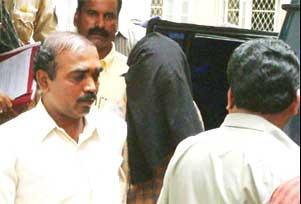 | « Back to article | Print this article |


An MD, an MBA, an aeronautical engineer. Professionally they have little in common, but personally they have much -- an acute sense of injustice, a fierce disgruntlement with India, a violent desire for 'revenge.'
Educated, intelligent and suave, they are the new face of terrorism across India. Consider this: Of the 23 main accused in the bomb blasts in Mumbai since December 2002, five are engineers, three doctors, two graduates, and one an MBA.
"Some of them have been victims of communal violence," says Shankar Mahadevan, a leading psychologist in south India. "Some take up causes and some are greatly upset because they feel that even if they become doctors or engineers, they would be treated with suspicion due to their religion."
Such feelings make them easy prey for brainwashing by organisations like the banned Students Islamic Movement of India, according to the police.
"A few years ago," a Delhi police official says, "we could not even think an MBA or a doctor would organise bomb blasts."
Check out this list -- some are accused of involvement in the blasts, some are in police custody, some in hiding:
To understand what breeds terrorism in educated minds, rediff.com spoke to Saleem Khan (not his real name), an engineering student at a Mumbai college. In January 1993, when Mumbai was engulfed by the post-Ayodhya communal riots, Saleem's father, a government employee, was murdered by a Hindu mob.
Saleem was eight then. He was saved because his mother locked him inside their house. From there, he listened to his father's screams for help.
Ten years down the line, Saleem awaits justice outside the collector's office in Mumbai. "We were told we would get Rs 200,000 as compensation," he says. "They have given us nothing till now."
Why? "Simple. I am a Muslim. The Hindus in this country cannot share anything with our community. This is their rule. Muslims just have to obey them quietly. If we argue, we will meet the end of my father."
After his father's killing, Saleem has not returned to his house in a Hindu area. He never will, he says. "What is the point? Those people never supported us when we needed them."
Today he lives with his mother and sister in the Muslim ghetto of Madanpura, south-central Mumbai, hardly ever interacting with non-Muslims. "What is there to interact?" he says. "Muslims must not trust them."
Saleem is one of hundreds of educated Muslims for whom there is only angst and thoughts of vengeance.
"Here," Saleem says, "no one will give me a decent job because of my religion."
Youth like Saleem, according to security specialists, could easily turn against India. "They would slip into the ways of violence and terrorism," says V Balachandran, who retired as special secretary in India's external intelligence agency, the Research and Analysis Wing, "because there is nobody to listen to their problems, complaints and needs."
Balachandran says the government must address and negate the feeling of alienation among this segment of the population. "It is time the Indian government talked to this particular section."
Written By George Iype. Reported by George Iype, Syed Firdaus Ashraf and Ehtasham Khan
Design: Uday Kuckian
Part II: 'We never knew he was a militant'
Part III: 'Throw him out. He is Muslim'
Part IV: 'SIMI does not teach to kill'